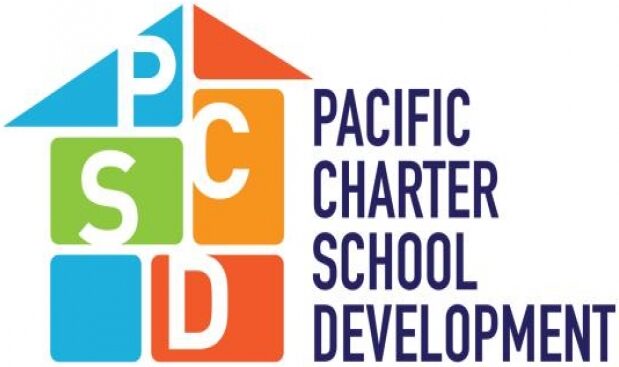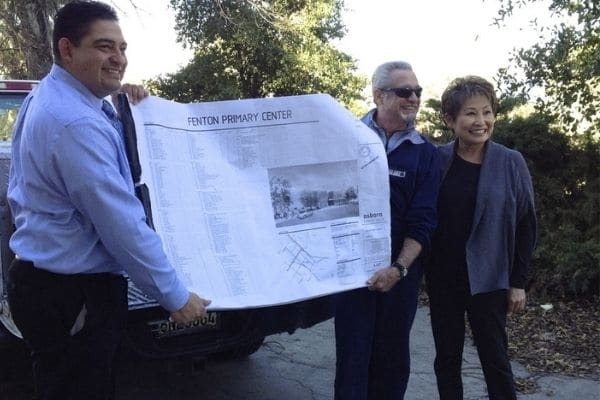Amidst boxes and packing supplies, I had the opportunity to virtually sit down with Irene Sumida, co-founder and former CEO of Fenton Public Charter Schools, as she was packing up to move out of state. She is retiring for the second time in a little over 10 years but she wouldn’t have it any other way. Irene is very good at building relationships and making connections. It’s how she, along with co-founder and Fenton’s first Executive Director Joe Lucente, built Fenton from one charter school to a full-fledged charter management organization (CMO) with five schools. Her mottos are “children first!” and “no secrets!”
Irene Sumida began her journey with Fenton 30 years ago at Fenton Avenue Elementary School in Lakeview Terrace in the Northeast Valley area of Los Angeles. Fenton was considered one of the most challenging and low performing schools in LAUSD; no one really wanted to attend or even work there. Two years later, with leadership from Irene and Joe, the staff of Fenton Avenue petitioned and were approved for charter status by LAUSD in June 1993. Fenton Avenue became LAUSD’s seventh charter school and charter number 30 in the state of California. As a conversion charter, the attendance area served by the school has remained on par with demographics of the surrounding area: 89% Hispanic; 8% African American; 65% English Learner; 90% qualifying for Free/Reduced Meals; 12% Special Needs. Charter status provided Fenton with the opportunity to tackle poor attendance, high student transiency, vandalism, overcrowding, low staff morale, lack of parental involvement, and low student performance. It is now one of the highest performing schools in North East San Fernando Valley.
In 2007, Fenton split into two schools on separate campuses to serve the growing population: Fenton Primary Center and Fenton Avenue. In 2011, Fenton’s leadership team which included Irene Sumida and Joe Lucente formed the charter management organization, Fenton Charter Public Schools, in order to ensure long-term growth and stability.
Fenton soon after added Santa Monica Boulevard Community Charter School to their organization. Santa Monica was a struggling charter that was successfully revived with the leadership of Irene and Joe and an amazing staff, many of whom moved from Fenton Avenue.
In 2013, Fenton received the prestigious Hart Vision School of the Year Award for its leadership and continued success in school transformation. In 2015, Fenton Academies was established in Sunland with two schools: Fenton Charter Leadership Academy and Fenton STEM Academies.
Over the past nine years, PCSD has partnered with Fenton to manage the development of three new school facilities projects for a total of 1,952 new charter seats, and with the current one due to be completed in early 2022. I asked Irene to tell me a bit about Fenton, how they have been impacted during the pandemic, and what has been their relationship with PCSD.
What makes Fenton unique?
Fenton is unique in that we have always focused on teacher leadership and “children first”. I was a teacher for 18 years at the LAUSD and was given every opportunity to learn and grow by my principals. This taught me how strong and successful a school could be if teachers became the leaders of the school. Having a vested interest, learning how to lead a school, what it takes instructionally as well as financially – all ensure that the school functions at its best. This, along with always putting the interests of children FIRST ensure that teaching and learning are the focus of the school. Children first, not adults.
What is your most memorable moment from your time leading Fenton?
There are so many memorable moments – that is difficult to say. I think it would be the approval of the Fenton Primary Center. That approval eventually led to the construction of the school and getting Fenton Avenue and Fenton Primary off the year round, multi-track 163-day Modified Concept 6 calendar. We did this on our own, without the help of the District or philanthropy. Quite a feat! We moved from 163 days of instruction to 184 days. So, children first.
How did the Covid pandemic impact Fenton?
We (David Riddick, Chief Academic Officer, and I) saw it coming. We talked about what to do and projected how long the shutdown would last. As others talked about opening in the fall, David and I knew that we would not see a quick reopening (I have three doctors in the family and heard about what was happening every day). David really stepped up and took over and I have to give him all the credit for how Fenton handled this. He led the effort, and led the directors at each site to ensure we responded responsibly and quickly. I believe Fenton pivoted to a distance learning mode quickly and seamlessly because of David’s readiness and instructional prowess.
What significant steps did you take when pivoting to virtual learning?
Again, David took the lead here. He met with the Lead Teachers at each site collectively and continuously. The structure we had in place to ensure “all voices are heard” proved invaluable. He talked to teacher leaders and school leaders every day, not only to get feedback, but to get a sense of how everyone was doing emotionally. This is something he is very mindful of, and which Fenton has always acknowledged as critical to ensuring strong teachers and an excellent learning environment.
How did you keep your community going?
David sent letters home to the community weekly. They were kept well informed of every decision and how Fenton was responding to the pandemic. No secrets at Fenton. We have learned this over the past 30 years – be honest and direct.
What made you decide to go with PCSD with your first facility project?
The reputation of PCSD. Kate, our Project Manager at the time, was wonderful and supportive as we built the Fenton Primary Center. Always at the site, and even after opening, she was there. She even knew the names of some of our most challenging students. The work is personal and I love that.
How did PCSD facilitate the long-term lease of the commercial facility you have leased? What were they able to make happen that you couldn’t do on your own or with another group?
Hope Fang, current Senior Project Manager, like Kate, is always there to guide and assist. I do have to say that I developed a strong relationship with the owner and his son, and that helped.
What were the biggest challenges of dealing with a commercial landlord who was not used to dealing with a charter school?
There were few challenges as Gary and Rick Henson are proud and professional owners. They respect our work ethic and commitment to education, so there were no challenges. When we considered leasing the business office site, I told Rick (the father and owner) that we could afford only half of the lease price. He lowered the price to that amount!
What surprised you the most about working with PCSD?
From what I experienced when the entity started to when we worked with PCSD in 2012, I was surprised by how accommodating and humble the team was.
Has working with PCSD changed your mindset on a full service real estate development partner?
Yes – I would recommend them. They make the entire process easier and less stressful.
If you are considering a future phase of development, would you consider working with PCSD again? And why?
Yes. The professionalism, work ethic, knowledge and personal touch.
Anything else you would like to add?
It has been a pleasure to work with PCSD as we built the Fenton Primary Center and renovated the Fenton Academies in Sun Valley. They are a class act!


